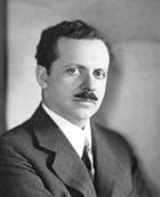
Edward Bernays
Edward Bernays was an Austrian-born American publicist, sometimes called "the father of public relations".
Sourced
- The three main elements of public relations are practically as old as society: informing people, persuading people, or integrating people with people. Of course, the means and methods of accomplishing these ends have changed as society has changed.
- Crystallizing Public Opinion (1923)
- This is an age of mass production. In the mass production of materials a broad technique has been developed and applied to their distribution. In this age, too, there must be a technique for the mass distribution of ideas.
- "Manipulating Public Opinion", American Journal of Sociology 33 (May, 1928), p. 958–971
- The engineering of consent is the very essence of the democratic process, the freedom to persuade and suggest.
- "The Engineering of Consent", Annals of the American Academy of Political and Social Science No. 250 (March 1947), p. 113; Reprinted in Edward L. Bernays, Howard Walden Cutler, The Engineering of Consent, University of Oklahoma Press, 1955
- Goebbels [...] was using my book Crystallizing Public Opinion as a basis for his destructive campaign against the Jews of Germany. This shocked me.
- Biography of an Idea: Memoirs of Public Relations Counsel (1965)
- It is sometimes possible to change the attitudes of millions but impossible to change the attitude of one man.
- Quoted in L. Tye The Father of Spin (1998) p. 102
- For the same reason I read the National Geographic, I like to see places I will never visit.
- Quoted in L. Tye The Father of Spin (1998) p. 102
- On why he read Playboy
- The best place to find things: the public library.
- Quoted in L. Tye The Father of Spin (1998) p. 102
- The best defense against propaganda: more propaganda.
- Quoted in L. Tye The Father of Spin (1998) p. 102
Propaganda (1928)
- Unless otherwise noted, page numbers refer to the 2004 Ig Publishing edition, ISBN 0970312598 (The text begins on p. 35, after an introduction by Mark Crispin Miller.)
- The conscious and intelligent manipulation of the organized habits and opinions of the masses is an important element in democratic society. Those who manipulate this unseen mechanism of society constitute an invisible government which is the true ruling power of our country. We are governed, our minds are molded, our tastes formed, our ideas suggested, largely by men we have never heard of. This is a logical result of the way in which our democratic society is organized. Vast numbers of human beings must cooperate in this manner if they are to live together as a smoothly functioning society.
- p. 37
- In almost every act of our lives, whether in the sphere of politics or business, in our social conduct or our ethical thinking, we are dominated by the relatively small number of persons [...] who understand the mental processes and social patterns of the masses. It is they who pull the wires that control the public mind, who harness old social forces and contrive new ways to bind and guide the world.
- p. 37–38
- In theory, everybody buys the best and cheapest commodities offered to him on the market. In practice, if every one went around pricing, and chemically testing before purchasing, the dozens of soaps or fabrics or brands of bread which are for sale, economic life would become hopelessly jammed.
- p. 39
- Propaganda is the executive arm of the invisible government.
- p. 48
- A single factory, potentially capable of supplying a whole continent with its particular product, cannot afford to wait until the public asks for its product; it must maintain constant touch, through advertising and propaganda, with the vast public in order to assure itself the continuous demand which alone will make its costly plant profitable.
- Page 63 (1928 edition?)
- If we understand the mechanism and motives of the group mind, it is now possible to control and regiment the masses according to our will without them knowing it.
- Page 71 (1928 edition?)
